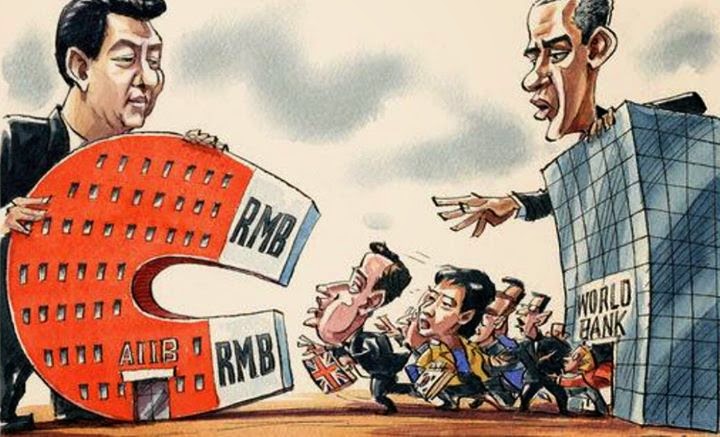
Washington Hegemony Hastened the Coming of the Asian Infrastructure and Investment Bank
The Washington-headquartered World Bank has always been controlled by an American CEO, while its rules, regulations and actions are under the command of Washington, which has the final say. The Asian Development Bank, headed by a Japanese president, keeps its fingers pressed firmly on the weakening pulse of the outmoded conventions set by an old and doddering Uncle Sam. Even though China’s gross domestic product is already twice that of Japan, in the Asian Development Bank, China has a mere five percent right to speak. In the World Bank, China’s right to speak is less than that of Japan. In TPP negotiations, Beijing was ousted entirely. The collective voices of China and other developing nations have been utterly disregarded, and a deaf ear has been turned to their suggestions on how current international financial structures could be “expanded and reformed.” It’s no different than the dissatisfaction that Europeans felt at the turn of this century, as America manipulated the U.S. dollar against a euro still in its infancy. Beijing has no choice but to propose the AIIB. In other words, it was precisely America’s authoritarianism that has hastened the coming of the Asian Infrastructure and Investment Bank.
Washington Has Shamed Itself by Its “Slip Up”
After Beijing announced the foundation of the AIIB, old senile Washington had another curious lapse in judgment as it immediately launched a diplomacy war with the AIIB. Like Rambo, Obama went in bare-chested and guns blazing, both overtly and covertly suggesting to his allies that they should boycott China’s initiative, falsely claiming that “the China-led AIIB bank is not as transparent as the World Bank.”* AIIB rules, still fresh from the oven, were “predicted” by Washington to be “non-transparent,” thus only magnifying hegemony on the part of the White House. The Asian Investment Development Bank is Beijing’s great effort to break through the blockade imposed by the U.S. and Japan. It is also a focal point of worldwide contention. Western countries have ignored America’s hints and have, one after another, shifted their allegiance to Beijing — a clear sign of the waning power of “American hegemony.” The U.S. once tried, by any means necessary, to strangulate the euro while it was still in the cradle, as it were. Today, we once again see Washington putting forth the effort to see that the AIIB has a premature end, but this will ultimately prove to be fruitless.
Not only will Obama not get away with his hegemonic aspirations, but those very aspirations will actually lead the country to its most embarrassing moment of the century. The British media believe that with so many European countries joining the AIIB, it illustrates an Obama strategic “defeat,” and also proves that a dark and bitter end has come to America’s “check China” approach. The Economist reminds Washington that it should look at the situation calmly. With such a tremendous demand for infrastructure in Asia, Beijing’s rise is just a fact of life; not only should America accept its allies’ membership in the AIIB, it should also “get down off its high horse” and apply for membership itself. The Financial Times said, “American investment in Beijing is just the beginning of the first chapter.” Notable American think tanks have long warned that opposing allies who join the AIIB is a grave error in judgment and that Obama should definitely take a good long look in the mirror and trust that America will ultimately change its standpoint.
Financial Power Is Now Slanted Towards Beijing
The AIIB is the developing world's challenge to post-war America’s role as the center of a world order in which it dictates international rules, financial schemes and systems. The focal point of this contention literally centers on who will ascend to direct the future of Asia’s economic development. The United States’ refusal to join the AIIB, the constant pressure it exerts on its allies, and the fact that it has disallowed other western countries from joining — essentially demanding that others not do what is advantageous to their own economies — is simply hegemony in the extreme. If Obama doesn’t stand down on this issue in a timely manner, if he continues to throw up roadblocks, then he’s going to draw even closer to a very precarious and potentially embarrassing situation. England, France, Germany, Italy and other European countries have expressed great interest in the AIIB. The future of world financial power is now leaning in Beijing’s direction. If America continues trying to buck the trend like this, then its power within the World Bank and international financial institutions will be severely weakened.
Every year China imports $2 trillion worth of goods, creating 200 million jobs for those involved. China is a powerful engine creating economic development for the entire world, and at present it wields great power and influence in Asia. The developed counties of the West are disregarding America’s need to save face and are successively joining the AIIB as founding members. The purpose is clear, to get a piece of the lightning-fast Asian development pie, while resuscitating their flagging economies in the process. The very design, implementation and existence of the AIIB have been a shot in the arm to China’s influence, while at the same time it has proven to be a perfect counterweight, increasing China’s ability to contend with America for the right to determine worldwide financial, economic and trade rules. Beijing has openly announced that the AIIB will not be a “political tool of China,” which only goes to show from the way Beijing handles its affairs, that it is much more broadminded and much fairer than America.
*This quotation, although accurately translated, could not be independently verified. In addition, since the publication of this article, Obama has issued a statement claiming that he doesn’t oppose Western countries joining the AIIB.

